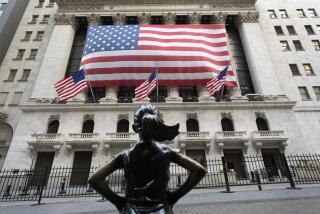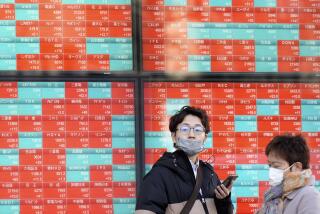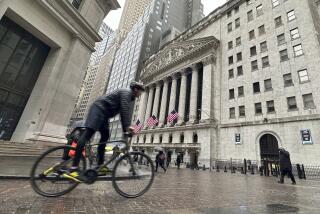Stocks plunge on worries about interest rate increase
Wall Street’s long-running bull market got a jolt Thursday from investors increasingly worried that the improving economy will push policymakers to raise interest rates sooner than expected.
Stocks have been tumbling this week, and Thursday’s 317-point drop in the Dow Jones industrial average left July in the red and wiped out what was left of its gains for the year.
The Dow’s 1.9% decline Thursday to 16,563.30 was eclipsed by the broader Standard & Poor’s 500 index, which fell 2% to 1,930.67, and the tech-oriented Nasdaq composite, which lost 2.1% to 4,369.77.
Traders also feared that several years of low market volatility could be coming to a close and fretted about strife abroad and uncertainty over employment data expected Friday.
“What we’re seeing makes perfect sense on a number of fronts. The potential was always there for this to happen,” said Bob Keiser, vice president of S&P Capital IQ’s Global Markets Intelligence unit. “Now, it’s finally happening.”
Recent economic reports have been promising, which some investors worry may convince the Fed to shut off the spigot after years of easy-money policies aimed at stimulating the slow economic recovery from the Great Recession.
The Commerce Department said gross domestic product, or total economic output, expanded at a 4% annual rate in the second quarter, more than most economists expected. But with a major contraction in the first quarter, the average was only about 1% for the first half of the year. Economists, nevertheless, expect continued strong growth through the rest of the year.
First-time claims for jobless benefits rose to 302,000 last week, but the less volatile four-week average hit an eight-year low of 297,250, the Labor Department said Thursday.
And a slew of data to be released Friday — especially July’s job market and unemployment numbers — may offer even more evidence of a strengthening recovery.
The government tally of nonfarm payrolls is expected to show a gain of 233,000 jobs, and the national unemployment rate is expected to remain unchanged at 6.1%. But economists said that if the rate falls to 6% or below, the Fed could see the decline as a cue to tighten monetary policy before the expected mid-2015.
Raising a key Fed interest rate, which has been near zero since 2008, would probably lead to higher borrowing costs for consumers and businesses, possibly crimping the housing market and consumer spending. Wall Street also fears higher rates would hamper corporate borrowing, especially for expansions. Hence, the sell-off in stocks.
Some analysts, such as Sterne Agee Chief Economist Lindsey Piegza, say that the Fed’s actions at its regular meeting this week also sent a signal that economic growth still wasn’t as robust as hoped, another factor putting pressure on stocks.
“It’s a reality check to what’s happening in the economy. It’s not as rosy as so many people would like to think,” she said.
Contributing to the sense of unease are a host of problems abroad. Chief among them are Russia-Ukraine tensions, the relentless march of Isis militants across Iraq, and fighting between Israel and Hamas in Gaza.
German sports gear firm Adidas, for instance, said Thursday that higher risks in Russia, where the U.S. and European Union intensified sanctions this week, compelled it to significantly reduce plans to open stores in the region as it ramps up store closures. It also lowered its full-year profit forecast.
Argentina, which lost its appeals in U.S. courts over its sovereign debt, failed to resolve its issues with bondholders in last-ditch talks late Wednesday and fell into default for the second time in 13 years.
“It’s an accumulation effect,” said Alan Whitman, a managing director of Morgan Stanley. “The news just doesn’t seem to improve, and for a lot of people, it becomes more than they want to deal with.”
A smattering of disappointing earnings this week also put a damper on the market.
Time Warner Cable Inc.’s shares slid $6.32, or 4.2%, to $145.10 on Thursday after it lowered its revenue growth projections for the year to as low as 3.5% from 4.5%. The company manages SportsNetLA — the channel now broadcasting Los Angeles Dodgers games — but has been stuck in a pricing standoff with other distributors.
Exxon Mobil Corp. also took a hit after it said its global production of oil and gas fell to its lowest point since 2009. Shares of the world’s largest energy company sank $4.31, or 4.2%, to $98.94 a share.
On Wednesday, Whole Foods Market Inc. reported a 3.9% increase in same-store sales that left investors cold. The organic grocer lowered its full-year forecast for same-store-sales growth to a range of 4.1% to 4.4% from its previous projection of a 5% to 5.5% upswing. Shares fell 88 cents, or 2.3%, to $38.23 a share.
But S&P’s Keiser dismissed the notion that, across a wide swatch of reporting businesses, earnings for the quarter were so-so.
“A couple of companies are not going to outweigh the overall complexion of earnings, which have been strong,” he said.
Twitter: @tiffhsulatimes







